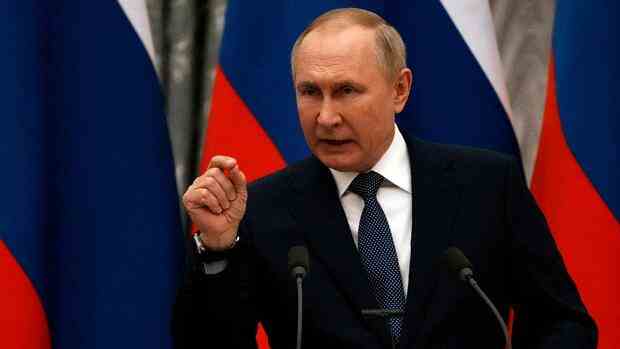Berlin The order by Russian President Vladimir Putin that EU states and the USA can only pay their gas bills in rubles could have a significant impact. Further details on Putin’s plan are not yet known, the implementation should be worked out within a week.
In principle, however, the announcement could indirectly force the West to decide either to circumvent its own sanctions or to boycott Russian gas. For Germany in particular, this would have significant repercussions.
So far, Russian gas suppliers like Gazprom mainly paid in dollars. The Russian supplier then has to exchange most of the payment for rubles with the Russian central bank.
Putin now wants the West to pay suppliers in rubles straight away. But there is not enough Russian currency on the international financial markets, writes economist Jens Südekum on Twitter. The only alternative then is to get the rubles directly from the Russian central bank.
Top jobs of the day
Find the best jobs now and
be notified by email.
However, the West has frozen their currency reserves for a few weeks. “In this way, Putin is indirectly forcing us to circumvent our own sanctions,” writes Südekum, who is a member of the scientific advisory board of the Federal Ministry of Economics.
Given the experiences of the past few weeks, it seems unlikely that Putin can be prevented from pursuing his plan by tough counter-sanctions from the West. And so there is possibly only one alternative to circumventing its own sanctions: a gas embargo on the part of the West.
The federal government in particular has so far resisted this measure because it fears significant upheavals for the German economy and consumers. Germany gets more than half of its natural gas from Russia.
The Bonn economist Moritz Schularick believes that there is no alternative to an embargo in view of the latest developments. “In this way, we importers are drawn even deeper into the Putin system. Get out!” he demands.
Economics Minister Robert Habeck (Greens), on the other hand, fears “a severe economic crisis in Germany and Europe” in the event of an embargo. Numerous companies would have to stop their production, supply chains would collapse. Then the “social peace” is in danger.
According to information from the Handelsblatt, the federal government is already preparing the economy for a failure in Russian gas supplies. Under the leadership of Federal Network Agency consideration is given to which companies should be taken offline first in an emergency. However, there is not yet a plan as to which companies would be specifically affected by such measures.
>>> Read here: The federal government is working on a shutdown plan for industry in the event of a gas supply stop
With a view to Putin’s order itself, Habeck was initially relaxed on Wednesday. “That doesn’t scare me much now,” he replied when asked what the consequences of the announcement would be. The gas supply is currently secured. Precautions still have to be taken for the winter of 2022/2023, but we will do so worked hard.
Putin’s ruble plan is “first of all a breach of the treaties,” explained Habeck. He will now discuss with the European partners how to respond.
It is unclear to what extent the measure will help the Kremlin boss or whether he only wants to harm the West. So far it’s been like this: if Gazprom receives dollars for a gas delivery and exchanges them for rubles at the central bank, the rubles are just as much on the market as if the West exchanged its dollars for rubles directly.
The professor of international economics believes an energy embargo against Russia is more likely after Putin’s announcement.
(Photo: Imago Images)
But former economist Peter Bofinger sees a difference: “If we have to buy the rubles on the foreign exchange market, that immediately strengthens the exchange rate of the ruble.” For Putin, there is no danger that the dollars will end up in accounts sanctioned by the West and thus excluded from exchange for rubles. In fact, the announcement promptly strengthened the Russian currency, which is under massive pressure.
The managing director of the German Economic Institute (IW) Hubertus Bardt meanwhile sees a second possible motivation. The question is what will happen if the West simply continues to pay in dollars or euros: “Will the gas deliveries then be stopped? Or is this a bluff to get the central bank out of sanctions?”
“Unfriendly States” Rule
Despite the change in the payment method, gas deliveries would continue to be fully guaranteed, Putin assured in a government video conference on Wednesday, which was broadcast on state television. Payment for Russian goods in foreign currency has lost its meaning.
The “unfriendly states” blacklisted by Russia are affected. This includes Germany and all other EU countries, but also the USA, Canada and Great Britain.
>>> Read here: Energy embargo against Russia: Is Germany threatened with economic decline?
The central bank and the Russian government now have a week to determine the modalities for switching from foreign exchange payments to ruble payments, Putin said. The West itself has devalued its currencies by freezing Russian assets abroad.
As a reaction to the Western sanctions, the Russian government had already decided at the beginning of the month that its own financial obligations to “unfriendly states” would only be settled in rubles. These include Ukraine, Switzerland and Japan.
More: No delivery commitment, but good signals: Habeck agrees long-term energy partnership with Qatar

